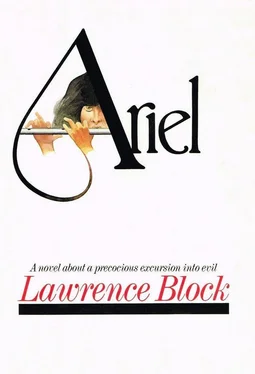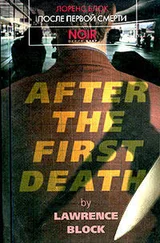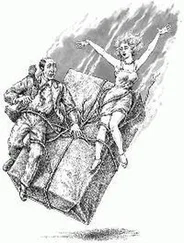Of course he had seen Ariel before — the time he dropped off Roberta, and before that at Caleb’s funeral. But this was the first time he had ever truly experienced the child. The child. That was Roberta’s phrase for her, and he was beginning to understand the usage. There was something curious about her, a quality unquestionably evident even in a brief meeting of the eyes. A sort of transported quality, at once disturbing and compelling.
“Mr. Channing? This way please.”
He followed a slender young woman into a sizable windowed office where a thickset woman in her late thirties sat behind a large blond oak desk. She rose at Jeff’s approach, introduced herself as Ms. Anne-Marie Craig, and shook hands like a man. She sat down again and Jeff took a chair across the desk from her.
“Now let me make certain I understand the situation,” she said. “You’re an attorney representing Mr. and Mrs. David Jardell. Is that right?”
“Not quite. My client is Mrs. Jardell.”
“The Jardells have separated?”
He shook his head. “But my inquiries are being undertaken on Mrs. Jardell’s behalf and without her husband’s knowledge.”
“I see.” Her eyes dropped to a sheet of paper on her desk. “The Jardells adopted a female infant through our agency some twelve years ago. I believe they named her Ariel.”
“That’s correct.”
“And your purpose in coming here—”
“Is to inquire into Ariel’s parentage.”
”I’m afraid that’s impossible. CPS has a policy absolutely forbidding the release of such information. It’s a two-way street, Mr. Channing. The natural mother is absolutely prevented from making contact with her child, and the child and his adoptive parents are not permitted to know who the mother is. I’m afraid we’re quite strict about that, and I’m sure you can appreciate the advantages of the rule.”
“There have been some cases recently challenging that sort of policy.”
Ms. Craig nodded briskly. “Several of them, and the courts have ruled differently in different states. There’s an argument that an adopted child has a right to information about his or her parentage. Our own policy has been revised accordingly, without altering its basic purpose. When a child reaches maturity, which we define as the age of eighteen, he or she can advise us that he or she — why don’t I just say she since the Jardell child is female?”
“Fine.”
“She can advise us that she wants to contact her natural mother. At this point we release no information. Instead we make an effort to contact the mother ourselves, informing her that the daughter wishes to make contact. If the natural mother is not interested in allowing this, her right to privacy is respected. If the natural mother does want the child made aware of her identity, then we furnish the child with that information. In this particular case, the child will not be eighteen years old for over five years. When the child is a minor, we do not even set about attempting to trace the mother and ascertain her wishes. That’s policy, Mr. Channing, and we won’t bend it.”
He nodded; he’d expected as much. “Suppose what I want, what my client wants, is information about the natural parents.”
“Information which would not serve specifically to identify them?”
“That’s right. The question’s a medical one, Ms. Craig. My client’s concerned about the medical history of the biological parents and the possibility of inherited predisposition to disease.”
“If there were anything of that sort she would have been informed prior to the adoption. You mean some sort of genetic illness like hemophilia or Huntington’s chorea? I checked our files before seeing you, Mr. Channing. Our records indicate the natural mother was in perfect health and had nothing ominous in her medical history.”
“And the father?”
“We have no data on the father.”
“He’s unknown?”
“Unknown to us,” Ms. Craig said. “He may have been known to the mother but she may have elected to keep that information to herself. Many of our mothers prefer to do that.”
He thought of Roberta, keeping the fact of Caleb’s paternity from him. Did Ariel’s father even know that he’d sired a child?
“So there’s nothing known about the father’s medical history,” he said.
“Nothing, I’m afraid. Is Ariel displaying symptoms of some illness?”
“Not a physical illness.”
“Oh?”
“My client is concerned about her daughter’s emotional health. She thought if there were any information available about the mother, information not dealing with her identity per se, it might be helpful in evaluating her present condition. If you could tell us anything about her personality, her lifestyle, her background—”
“Excuse me a moment, Mr. Channing.” He waited while she disappeared through a door on the left. He sat looking out through the window, watching traffic on the boulevard, until she returned.
“Nothing,” she said. “I’m afraid there’s no one here who worked at CPS at the time Ariel was born, so no one remembers her mother. Our records don’t indicate mental illness or eccentricity of personality or anything of the sort. Is Ariel institutionalized at present?”
“No, she’s living with the Jardells.”
“Is she receiving psychiatric treatment?”
“No.”
“But your client is concerned about her emotional state?”
“Yes.”
“Ariel must be on the verge of puberty. A great many children find that stage a stressful one. Sometimes the answer is treatment, sometimes they just have to be allowed to grow out of it. But the problem’s rarely hereditary, Mr. Channing. Adoptive parents sometimes like to think a problem is hereditary in order to absolve themselves of blame. Perhaps you could find a tactful way to suggest as much to Mrs. Jardell.”
The lilting song of the flute filled Ariel’s bedroom. But she was not playing now. She sat on the edge of her bed listening to a cassette she had recorded earlier. She heard it all the way through, sitting with her eyes closed, her body swaying very slightly with the music. Now and then expressions played over her face in response to something she heard.
When the music stopped she rewound the tape and let it play through a second time. This time she did not give the music her undivided attention. While she listened, she wrote in her diary.
This is very strange. Listening to myself on Erskine’s tape recorder. It’s like hearing myself for the first time. I can’t really hear myself when I play because I have to concentrate on playing.
The reason all of this is happening is I couldn’t play the flute for Erskine. He kept saying he’d like to hear me play and I kept saying he wasn’t missing much, and finally the other day I dragged the flute over to his house after school and we went up to his room and I tried to play. But I couldn’t make it come out right. I could hear the notes in my head but I couldn’t seem to find them on the flute.
So he thought of the tape recorder. It’s a Japanese one, portable, and you can plug it in or use batteries, and you get half an hour on each side of the tape. He said I could take it home with me and just put it on when I play, and before I knew it I would forget it was even in the same room with me.
“You’ve been on tape before,” he said, and he found a cassette and played it for me, and it was a conversation we had the other day about how he found out I have to be eighteen before I can try to trace my real mother. He had taped it without me knowing anything of it.
When he played the tape I got properly pissed. I don’t guess there was anything on it you couldn’t play in church but it was the idea of him doing it secretly that bothered me. I told him if he was President he could get impeached for carrying on like that, taping people without them knowing it, and then we would up running some jokes on the subject which took the edge off my pissed-offedness. (If there’s even such a word, which there is now! )
Читать дальше







